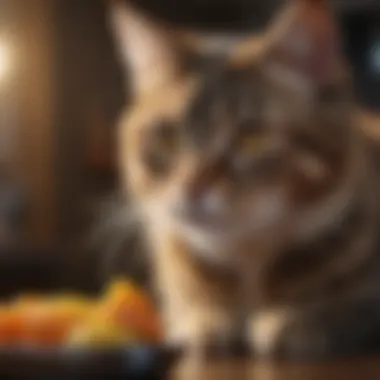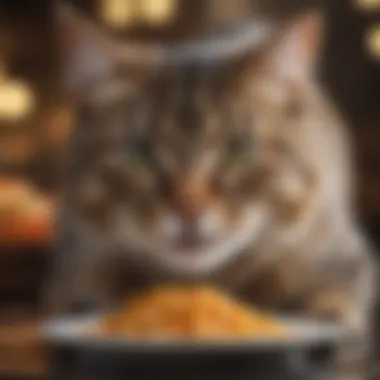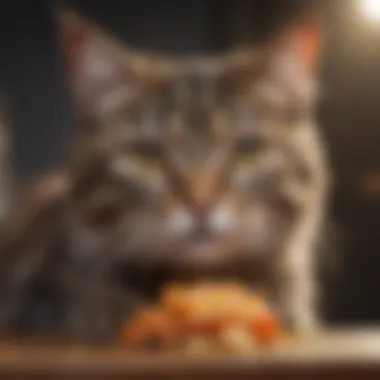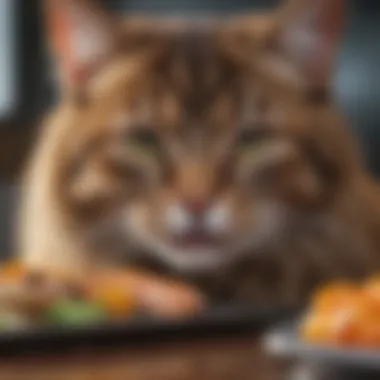Optimal Choices for Wet Food in Cats' Kidney Care


Intro
Feline health presents unique challenges, particularly when it comes to kidney disease. As this condition affects many cats, understanding the connection between diet and renal health is critical. The right nutritional choices can help manage symptoms effectively and improve the quality of life for these pets. This article aims to explore the best wet food options tailored for cats with kidney disease, providing insights into nutritional needs while reviewing commercial products and homemade recipes. It is crucial to address how dietary decisions impact overall wellness and to recommend consultation with veterinarians to ensure each cat receives personalized care.
Nutritional Requirements for Cats with Kidney Disease
Cats diagnosed with kidney disease require specific nutrients to support their renal function. Understanding these dietary needs can guide caregivers in making informed choices. Key components include:
- Low Protein Content: Limited protein helps reduce the build-up of toxins in the bloodstream. Special emphasis should be placed on high-quality protein sources.
- Controlled Phosphorus Levels: High phosphorus can exacerbate kidney issues, so lower phosphorus content is preferable.
- Increased Omega-3 Fatty Acids: Omega-3s, found in fish oil, may help mitigate inflammation and support kidney function.
- Adequate Hydration: Wet food is beneficial because it increases water intake, which is essential for renal health.
Best Commercial Wet Foods
When considering the best wet food for cats with kidney disease, several commercial brands have established their reputations for quality and effectiveness. These products are designed with specific dietary requirements that cater to renal health:
- Hill's Prescription Diet k/d: Known for its renal support formula, it contains low protein and phosphorus levels, while being enriched with Omega-3s.
- Royal Canin Renal Support: Offers several textures and flavors, addressing the problem of food aversion common in affected cats.
- Purina Pro Plan Veterinary Diets NF Kidney Function: A well-rounded option that balances essential nutrients while catering to the needs of cats with compromised kidney function.
"Choosing the right wet food can significantly impact the management of kidney disease in cats."
Homemade Alternatives
While commercial options exist, many feel inclined to prepare homemade meals. This requires knowledge of suitable ingredients:
- Cooked chicken or turkey (without seasoning) can serve as a high-quality protein source.
- Pumpkin is beneficial for digestibility and hydration.
- Carrots provide essential vitamins without overwhelming phosphorus levels.
Before embarking on a homemade diet, consultation with a veterinarian is essential to ensure complete nutrition.
Consulting with Veterinarians
Veterinary guidance is imperative when managing feline kidney disease. Each cat is unique, and factors such as age, weight, and overall health should influence dietary choices. Here are some important considerations:
- Regular Check-ups: Frequent veterinary visits can help monitor disease progression and adjust dietary needs accordingly.
- Customized Diet Plans: Vets can recommend food plans tailored to each cat’s condition.
- Supplement Recommendations: For some cats, nutritional supplements may be necessary to ensure they receive adequate vitamins and minerals without stress on the kidneys.
The End
Selecting the right wet food for cats with kidney disease is integral to maintaining their health. This requires careful consideration of nutritional needs, a review of available products, and collaboration with veterinary professionals. Understanding the issues related to renal function can empower caregivers with the tools necessary for optimal feline care.
Understanding Kidney Disease in Cats
Understanding kidney disease in cats is crucial for both owners and veterinarians. It provides insights into how to manage this serious condition effectively. As cats age, the risk of developing kidney disease increases. The kidney's role is significant as they filter waste products from blood, regulate electrolytes, and manage blood pressure. When kidney function declines, toxins can build up in the body, leading to various health concerns.
Recognizing kidney disease early can lead to timely interventions. This could be the difference between a cat living a comfortable life and experiencing severe complications later. Furthermore, a proper understanding helps in making educated decisions about diet and care. This knowledge is even more important considering that diet plays an essential role in managing kidney disease.
Overview of Kidney Function
The kidneys are vital organs in a cat’s body. They play a key role in filtering blood and producing urine. Each kidney contains millions of tiny filters called nephrons. Through these filters, blood is cleared of waste products and excess fluid. Moreover, the kidneys also maintain the balance of vital minerals like potassium and phosphorus.
When kidneys function properly, they help maintain overall health. However, when kidney function starts to decline, it can result in several health issues. Signs may include increased thirst, frequent urination, and despite eating, notable weight loss. Therefore, monitoring kidney health is important, especially in older cats.


Causes of Kidney Disease in Cats
Kidney disease in cats can be caused by various factors. Here are some common causes:
- Aging: As cats grow older, they become more prone to kidney problems.
- Genetic predisposition: Some breeds have higher risks for kidney issues.
- Infections: Bacterial infections may lead to kidney damage.
- Toxins: Exposure to certain toxic substances, like antifreeze, can harm the kidneys.
- Chronic diseases: Conditions such as diabetes or high blood pressure can contribute to renal damage.
Understanding these causes is important for prevention and awareness. Regular vet visits and monitoring health changes can make significant differences.
Symptoms to Watch For
Detecting kidney disease early may depend on recognizing specific symptoms that may arise. Common symptoms include:
- Increased thirst and urination
- Decreased appetite
- Weight loss
- Vomiting or diarrhea
- Lethargy
Observing these symptoms can help in timely diagnosis and management. Noticing even subtle changes in behavior or health is vital. If any of these symptoms appear, consulting a veterinarian promptly is advisable. The earlier kidney issues are identified, the better the chances for control and treatment.
Dietary Needs for Cats with Kidney Disease
Understanding the dietary needs for cats with kidney disease is crucial for managing this condition effectively. Cats with renal issues require specific nutrients that can help alleviate the stress on their kidneys and support their general health. These dietary considerations are not just about feeding; they are about enhancing the quality of life for affected felines. Selecting appropriate wet food types is vital due to the hydration aspect. Wet food generally contains higher moisture levels, which is beneficial for cats that often do not drink sufficient water. This section delves into the fundamental components of a renal diet and the reasons they matter.
Role of Protein in Renal Diets
Protein is a key nutrient for cats, but its role in the diets of those with kidney disease is nuanced. Many veterinarians suggest a moderate protein diet instead of severely restricting protein. The reduced protein level can ease the workload on the kidneys. However, the quality of protein is equally important. High-quality proteins provide the essential amino acids needed for overall bodily functions without overstressing the kidneys. Some recommended sources of high-quality protein include chicken, turkey, and fish. While protein management is critical, it is essential not to eliminate it entirely. A balanced approach allows the cat to maintain muscle mass and energy levels while being gentle on the kidneys.
Importance of Moisture Content
Hydration is essential for all cats, but especially for those with kidney disease. Cats are naturally inclined to drink less water, which can lead to dehydration and exacerbate kidney issues. Wet food provides a significant moisture content that dry food cannot match. Feeding cats with kidney disease a high moisture diet helps dilute toxins in the kidneys, promoting better kidney function. This is a crucial aspect of managing renal health. It is advisable to include wet food in their diet as a daily offering. Additionally, mixing wet and dry food can also contribute to hydration. This balance can encourage cats to consume enough moisture in their diet.
Sodium and Phosphorus Management
The intake of sodium and phosphorus must be carefully controlled in cats with kidney disease. High sodium levels can lead to hypertension and worsen kidney function. Many renal diets are low in sodium to help manage these risks. Similarly, phosphorus can be problematic. Elevated phosphorus levels can lead to secondary problems such as bone disease. Managing these elements is crucial to prevent further kidney damage. Most commercial wet foods for kidney disease have formulated levels of both sodium and phosphorus. It's essential to read labels carefully and consult with a veterinarian to ensure the selected foods align with the specific nutritional needs of the cat in question. Balancing these factors can make a significant difference in the health and longevity of a cat with kidney disease.
Best Commercial Wet Food Brands
Selecting the right commercial wet food is crucial for managing the diet of cats suffering from kidney disease. The nutritional profile of these diets can directly influence the health and well-being of these pets. Many brands now tailor their formulations for renal health, focusing on the necessary protein levels, moisture content, and reduced phosphorus and sodium.
In addition to meeting these dietary needs, the right commercial products should appeal to a cat’s palate to ensure they eat enough. Cats with kidney disease may have varying appetites, making the flavor and texture of the food a key element in sustaining their nutrition intake.
Important aspects to consider include ingredient sourcing, brand reputation, and product reviews. Ensuring a brand maintains high standards and accountability can lead to better health outcomes.
Brand Comparisons
When evaluating commercial wet food options, a variety of brands stand out due to their commitment to quality ingredients and formulation specific to kidney health. Among these, brands such as Hill's Prescription Diet, Royal Canin, and Purina Pro Plan Veterinary Diets rank highly. These brands provide dedicated renal diets that include lower protein levels but still supply high-quality proteins that are easier for the kidneys to process.
- Hill's Prescription Diet: Known for its Science Diet line, this brand offers wet food that is specifically designed for kidney support. The ingredients are carefully selected to maintain kidney function while ensuring palatability.
- Royal Canin: This brand provides a wide range of specialized diets, including those tailored for renal support. Their products often receive positive reviews for effectiveness and taste.
- Purina Pro Plan Veterinary Diets: This brand is noted for its veterinary-recommended formulas aimed at managing kidney disease. Their focus on nutrient balance is critical for cats with renal issues.
When comparing brands, look closely at guaranteed analysis on the label, review the ingredient list, and consider any beta-testing or clinical studies that support the brand's claims. Customer reviews can also shed light on how well the product works for various cats.


Top Picks for Renal Health
Based on the previous comparisons, several wet food options are standout choices for supporting kidney health.
- Hill's Prescription Diet k/d: This is specifically formulated for cats with kidney disease. It provides the right balance of protein, moisture, and essential nutrients essential for maintaining health.
- Royal Canin Renal Support: Available in both pouches and cans, it features a formulation aimed at promoting renal function and helps to stimulate the appetite due to its savory taste.
- Purina Pro Plan Veterinary Diets NF: This product combines a highly palatable taste with reduced protein and phosphorus levels, making it easier for cats with kidney disease to digest.
When selecting the best option, consult with your veterinarian to tailor the diet specific to your cat's individual health condition. Understanding a cat's unique dietary requirements plays a key role in their overall health management.
In summary, the best commercial wet food for cats with kidney disease combines palatability with proper nutrition, and informed choices can significantly enhance your pet's quality of life.
Homemade Wet Food Recipes
Creating homemade wet food for cats with kidney disease serves multiple purposes. It allows for precise control over nutritional content, helping to tailor each meal to individual health needs. This personal touch can be critical since commercial diets may not always meet specific requirements. Additionally, homemade recipes often utilize fresh ingredients, which might improve palatability and encourage cats to eat.
When a cat has kidney disease, proper nutrition becomes paramount. The right balance of nutrients in homemade meals can contribute to better health outcomes and enhance the quality of life. Moreover, this approach can be cost-effective in the long run, providing a nutritious alternative without the recurring expenses of specialized commercial products. However, one must be cautious to ensure that all necessary nutrients are included in these meals.
Balanced Nutrient Profiles
A well-balanced nutrient profile is crucial for supporting a cat's kidney health. It is essential to limit protein while ensuring that essential amino acids are available. Cats need protein sources that are high in quality to maintain muscle mass without overburdening their kidneys. Nutritional balance will incorporate vital vitamins and minerals, such as B vitamins and omega-3 fatty acids, which can help maintain optimal health.
The ratios of these nutrients should reflect the specific needs of a renal diet. Regular monitoring and adjustments to these profiles may be necessary as the cat's health evolves. Silencing any concerns about deficiencies is also important, as homemade meals can sometimes lack certain nutrients. Thus, working with a veterinarian to develop the right recipes is essential.
Ingredients to Include
Choosing the right ingredients is paramount in homemade wet food. Here are key components that should be considered:
- High-quality proteins: Sources such as chicken, turkey, and fish. These should be carefully cooked to ensure palatability and digestibility.
- Low phosphorus ingredients: Options like rice or sweet potatoes can provide necessary carbohydrates without boosting phosphorus levels significantly.
- Added moisture: Incorporating water or broth can help increase hydration, which is crucial for cats with kidney issues.
- Vitamins and minerals: Supplements might be necessary to guarantee a full nutritional profile. A veterinarian can guide the addition of these supplements.
When selecting ingredients, avoiding fillers or artificial preservatives is essential. Remember, whatever ingredients you use must adhere to the overall goal of supporting kidney function.
Cooking Tips for Optimal Nutrition
The method of preparation can significantly influence the nutritional quality of homemade cat food. Here are some practical tips for cooking:
- Avoid high-temperature cooking techniques: Methods such as grilling or frying can destroy essential nutrients. Favor steaming or poaching instead.
- Keep it simple: Fewer ingredients can reduce the likelihood of imbalances. Concise recipes focusing on high-quality ingredients could help maintain proper nutrition.
- Monitor cooking times: Overcooking can degrade proteins and quality of the food. Just enough cooking time ensures that nutrients remain intact while ensuring food safety.
- Consult regularly: Maintain open communication with a veterinarian about the recipes you are trying and any observed changes in your cat’s health. This will allow for adjustments to be made as needed.
"Homemade diets can be custom-tailored to meet the specific dietary needs of your cat, potentially improving their overall health and wellbeing."
In summary, making homemade wet food can be an effective way to cater to the unique dietary needs of cats with kidney disease. It is essential to understand the balance of nutrients, choose appropriate ingredients, and apply effective cooking techniques to ensure optimal nutrition.
Monitoring Nutrition and Health
Monitoring nutrition and health is an integral part of managing a cat's kidney disease. The right diet not only affects their physical well-being but also influences their overall quality of life. Careful observation and adjustment of nutritional intake can lead to improved outcomes for cats in this vulnerable state. Regular assessments help to establish the most suitable dietary plan, helping to prevent potential complications.
A key factor in this monitoring is the collaboration with a veterinary professional. They can provide insights tailored to the specific health needs of the cat. The veterinarian will assess factors such as weight, appetite, and hydration levels. This information helps to determine if the current diet is sufficient or needs alteration. Regular visits also allow for blood tests to track kidney function, which is vital in evaluating the effectiveness of the diet.
Importance of Regular Vet Check-ups


Regular vet check-ups are central for cats with kidney disease. These appointments help in diagnosing changes in health status early, which can be crucial. Blood pressure, kidney values, and hydration are important metrics to keep an eye on.
It is essential to keep a history of the pet's health status, especially how they respond to dietary changes. Note factors such as:
- Weight fluctuations
- Changes in appetite
- Litter box habits
- Energy levels
These observations aid veterinarians in making informed decisions about any necessary changes to the treatment plan. Consistent communication between owners and veterinary professionals creates a supportive environment for the cat's health.
Adjusting Diet Based on Health Changes
Adjusting the diet based on health changes is critical for cats with kidney disease. Kidney function can decline over time, which might necessitate changes in diet. For example, if lab results show higher levels of phosphorus, a lower phosphorus diet may be needed. Similarly, if the cat is losing weight, increasing caloric intake could become a priority.
Key considerations for diet adjustments include:
- Protein Levels: As kidney function declines, the protein needs can change. The quality of protein becomes more important than quantity.
- Moisture Content: A higher moisture content in food can help maintain hydration. This is key for kidney health.
- Nutritional Supplements: Sometimes, additional supplements like omega-3 fatty acids can help support kidney function.
Monitoring health changes and adapting the diet effectively ensures that cats with kidney disease can maintain a better quality of life. It's a dynamic process requiring partnership between the owner and veterinary team.
"Diet management should reflect not only nutritional needs but also the changing health status of the cat."
Ultimately, consistent monitoring and timely adjustments to the dietary plan are vital steps in managing kidney disease in cats.
Common Misconceptions About Feeding Cats with Kidney Disease
Misunderstandings surrounding the dietary needs of cats with kidney disease are common among pet owners. These misconceptions can lead to improper feeding practices that may exacerbate the health issues of these felines. It is crucial to clarify these points to ensure that cats receive the optimal nutrition necessary for managing their condition. Addressing these myths can guide pet owners in making informed choices about wet food, which is pivotal for the well-being of their cats. By dispelling inaccuracies, this section promotes a better understanding of what constitutes a suitable diet for cats facing renal challenges.
Myth vs. Fact
One prevalent myth is that all protein is detrimental for cats with kidney disease. This belief stems from the idea that protein overload stresses the kidneys. However, it is essential to understand that not all proteins are created equal. High-quality protein sources are vital for preserving muscle mass and maintaining overall health. Conversely, a total protein restriction can lead to a decline in the cat's health. Another misconception is the notion that renal diets must be bland or lack flavor. In reality, a well-formulated wet food can be both palatable and enriching, encompassing necessary nutrients that cater to cats with kidney concerns.
"High-quality protein can actually support kidney function, rather than harm it, depending on the amount and source."
Importance of Evidence-Based Feeding Decisions
Adopting an evidence-based approach to feeding cats with kidney disease is crucial for several reasons. First, it ensures that the diet aligns with the latest veterinarian guidelines and nutritional research. Cats with kidney issues require specific nutrients to aid their condition. Utilizing resources and scholarly articles on feline nutrition can help inform decisions that are backed by science rather than merely anecdotal evidence.
Furthermore, making feeding choices based on solid evidence can significantly improve the cat's quality of life. This means assessing ingredients carefully, ensuring proper phosphorus and sodium levels, and emphasizing moisture content in foods. Consulting veterinarians regularly about the diet, based on the cat’s health changes, reinforces the importance of evidence-based decisions. Ultimately, informed decisions can pave the way for better management of kidney disease in cats, leading to longer, healthier lives.
Ending and Final Recommendations
In managing kidney disease in cats, the importance of a proper diet cannot be overstated. This condition requires a nuanced approach to nutrition, emphasizing the right balance of proteins, moisture, and minerals. As we’ve discussed throughout the article, selecting the best wet food involves considering crucial nutritional components that promote renal health. Providing a suitable diet can primarily impact your cat’s quality of life, helping to alleviate symptoms and slow disease progression.
Recap of Key Dietary Considerations
When looking for wet food for cats with kidney disease, keep these dietary elements in mind:
- High-Quality Protein: While protein is necessary, it should come from easily digestible sources. Opt for foods that specify high-quality protein sources such as chicken or fish.
- Moisture Content: Cats with kidney disease need lots of water. Wet food naturally contains more moisture than dry food, aiding in hydration which is essential for renal function.
- Low Phosphorus and Sodium: To reduce strain on the kidneys, cats with this disease should have diets low in phosphorus and sodium. Always check labels for these components.
- Omega Fatty Acids: These can help support kidney function and overall health. Foods with added omega-3 fatty acids are worth considering.
It is helpful to always read the ingredient list and the nutritional analysis provided on the packaging. Understanding what is in your selected wet food helps ensure its suitability for your cat's specific needs.
Encouragement to Seek Professional Guidance
Always consult with a veterinarian when deciding on dietary options for your cat. Each cat is unique. A vet can provide personalized advice based on your cat's health status, weight, and age.
Veterinarians can guide you toward appropriate commercial foods or assist in formulating homemade diets. They can help monitor progress and make necessary adjustments based on your cat’s response to dietary changes.







